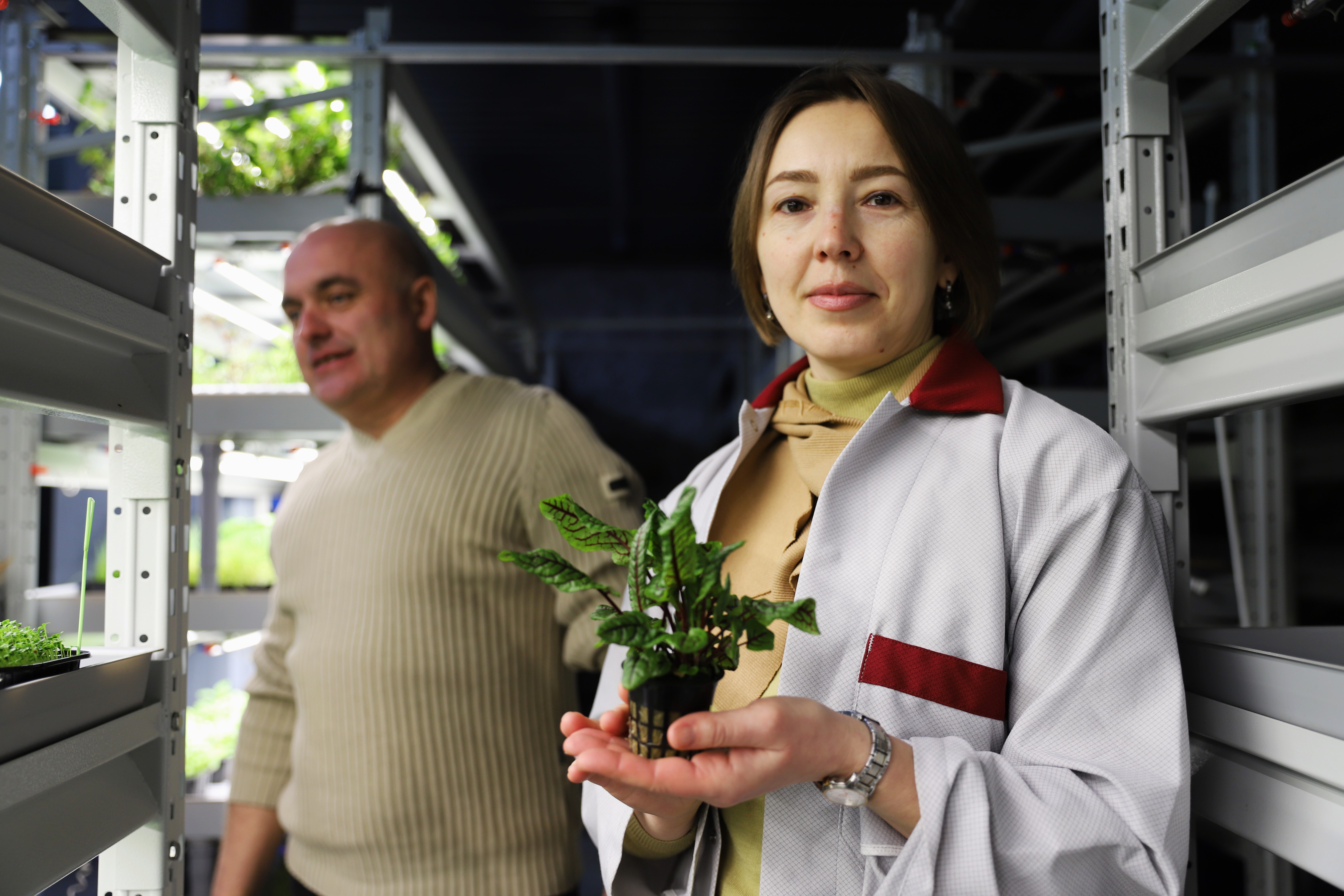Elena and Dzmitry have transformed a small metalworking enterprise into an urban farm in Bielaaziorsk, a town in the Brest region. Their family business is focused on growing organic microgreens, young edible seedlings of vegetables and herbs. The innovative business model offers an alternative to traditional agriculture in a peri-urban setting and enhances the livelihood of the local community.
Vertical Farming: A Solution for Sustainable Local Development
June 26, 2024

The seed of an idea
On the town’s outskirts the unassuming building of a former metal workshop hides a futuristic interior. Vertically stacked up are numerous shelves with greens seemingly growing with little interference. Automated lighting, irrigation, and air conditioning systems provide everything needed for the first leaves to appear. Elena and Dzmitry cultivate microgreens using a hydroponic system that requires little or no soil, maximizing the use of limited space.
Vegetables and herbs like broccoli or basil take weeks to months to mature. Their young seedlings, however, can be harvested in just seven-ten days as soon as the first set of true leaves develop. Consumed at an earlier stage, they are dense in nutrients, offering the same or higher health benefits as mature plants.
Dzmitry shares that setting up a technologically advanced business was not devout of challenges and involved a whole new learning process. With the support from the European Union, the entrepreneurs installed hydroponic systems capable of housing 1,500 plant trays across nine racks. They additionally installed sewing, ventilation, and heating systems, enabling the farm to operate even in sub-zero temperatures.
“When I experiment with different plants and cultivation techniques, I sometimes lose track of the rest of the world. Observing new life emerge from tiny seeds, grow strong, and transform into healthy, flavorful sprouts is immensely rewarding."Elena
These efforts paid off, and the family now cultivates approximately twelve varieties of baby leaves and microgreens, ranging from sunflower to kohlrabi, under their brand ShefDoza. Dedication to quality and innovation has garnered a loyal following among local customers. Looking ahead, the entrepreneurs are focused on scaling their business. This involves forging partnerships with local restaurants and food chains and setting up efficient sales and marketing systems, given that microgreens are a relatively novel product in Belarus.

Innovations in agriculture and sustainability

Vertical farming is a crucial driver of sustainability and an effective response to the challenges posed by urbanization. Locally produced microgreens have a significantly lower environmental footprint compared to produce transported from distant regions.
Their rapid growth cycle and minimal space requirements translate to potential savings in energy, water, and other resources. Additionally, urban farming obviates the need for chemical fertilizers and pesticides, which are prevalent in traditional agriculture and detrimental to soil health.
The controlled indoor environment of hydroponic farms protects crops from weather-related adversities, ensuring consistent and predictable yields throughout the year, irrespective of external climatic conditions. Furthermore, by reducing the necessity for additional farmland, urban farming aids in preserving natural ecosystems and biodiversity.
Benefits for local development
Micro-, small-, and medium-sized enterprises (SMEs) are vital for economic growth and sustaining livelihoods. Globally, SMEs account for up to 90% of businesses and 60-70% of employment. Innovative business models breathe new life into local communities, ensuring economic resilience and social well-being.
The United Nations Development Program (UNDP) is committed to fostering local economic development in Belarus through support to entrepreneurship.

In 2023, UNDP, in collaboration with the European Union and the Ministry of Economy, extended financial aid to 52 small and medium-sized businesses across Belarus, including Chernobyl-affected districts. This partnership led to the creation of 160 new local jobs. Additionally, 150 companies and entrepreneurs benefited from microfinance services, culminating in 267 successful leasing transactions.
Advancing local business initiatives, such as those led by Elena and Dzmitry, is crucial for achieving the Sustainable Development Goals. As empowered communities fulfil their full potential and adopt new technologies, they create a healthier and more sustainable living environment for all.
The Support to Economic Development at the Local Level project was implemented by the United Nations Development Programme (UNDP) in Belarus in partnership with the Ministry of Economy with the financial support of the European Union.

 Locations
Locations






